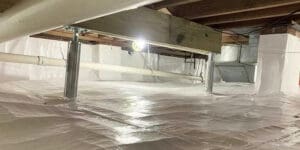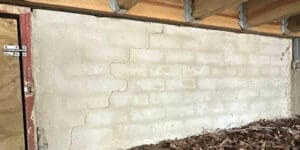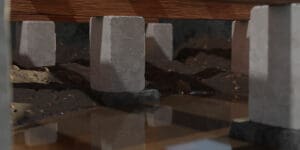Your foundation walls are built to sustain the weight of your home while also resisting moisture in the environment. When foundations are in good shape, you can live in a safe, dry environment. However, water leaks into your basement and causes damage to assets such as carpeting, heirlooms, and furniture, as well as mold development and disrupting your peace of mind.
It’s not as simple as squirting glue into foundation cracks to repair them. There are several sorts of foundations and cracks and very particular ways to accomplish basement crack repair for each of them. If you’ve seen wall cracks in your basement and want them repaired, there are a few things you should understand before hiring someone to do it.
Are you looking for a company to repair the cracks in your basement?
HydroHelp911 is the best at what we do, and we can assist you with any basement repair requirements you may have. We will come to your property or company, examine the damage, and give you an estimate, so you know precisely how much it will cost before we get started. Because our work is guaranteed, you can rely on HydroHelp911!
Have you noticed a crack and gaps in your basement?
Identifying the type of foundation fracture is the first step in correcting it. The most common types are listed below.
● Cracks that run horizontally
Horizontal cracks in the foundation of your basement are dangerous. Unbalanced soil and hydrostatic water straining on your foundation wall are common causes of this type of crack. In addition, water may be leaking into your basement due to the foundation leaning inwards. As a result, horizontal fissures can appear in both blocks and poured foundations.
● Cracks in the stairwell
Stair-step fractures are common in block foundations. These fractures appear along mortar joints and represent a significant threat to your basement foundation’s integrity. Two things can cause stair-step cracks: One portion of the foundation is sinking or settling or moisture issues outside your foundation.
● Hairline cracks
In the new construction of foundations across the country, hairline cracks are widespread. They usually occur within a year and are caused by the new foundation settling and drying.
● Cracks that run vertically
Vertical foundation wall cracks are less dangerous than horizontal fractures and do not constitute a structural risk. They’re most typically found in poured foundations that go straight up and down the length of your wall. Vertical cracks and gaps are some of the most common types of basement cracks in Huntersville. They are caused by the settling of the foundation over time or the natural curing of concrete.
Most diagonal foundation cracks, like vertical fractures, do not pose a severe threat to the structural integrity of your foundation. Instead, they are caused by the natural curing of the concrete foundation wall or settling over time and running at a maximum of 30 degrees vertical.
● Shrinkage foundation cracks
Shrinkage foundation cracks occur when poured concrete foundations dry out and lose moisture, similar to hairline cracks. Within the first year of construction, new homes are prone to shrinkage cracks. These fissures are typically vertical and do not represent a structural threat to your home’s foundation. The greatest danger is if you live in an area where there is a lot of Radon Gas, and it leaks into your basement.
Basement floor cracks can occur for the exact causes above, but they are not the same as cracks in walls. Unless there is an enormous amount of water pooling beneath your basement floor, floor fractures rarely leak. Consider installing a below floor drainage system if you have this issue. But first, ensure your sump pump is working correctly. Water seeping through the gaps in the floor is often an indication that your sump pump has failed.
Watch HydroHelp911’s video on basement waterproofing
It’s difficult, if not impossible, to seal basement floor fissures. Any waterproofing agent you try to adhere to the floor’s surface will eventually fail due to the concrete’s continual moisture, which prevents it from sticking well or permanently. The issue is that the basement crack repair is put to the side of the concrete where water enters first. Unfortunately, in the instance of basement floor fractures, the water is coming in from below, where you can’t see it.
Options for Basement Repair
Your basement repair options will be determined by the type of foundation that supports your home or business, the type and extent of damage to the foundation, and whether or not you wish to invest in foundation strengthening while repairs are being completed. Remember that these are merely national averages; there are a few foundation repair alternatives for most projects and some pricing differences for each. Therefore, your specific charges will be different.
Cracks larger than 1/8″ must be repaired. If your foundation has cracks greater than 1/8″, you should see experts like HydroHelp911 see if your home or company is sinking, shifting, or otherwise at risk of foundation damage in the future. Basement crack repair for more minor cracks is relatively inexpensive, with average costs of $500. Silicone or other patching materials are injected and dry into the cracks.
If your foundation is leaking, you’ll need to do a more thorough crack repair as well as waterproofing or sealing. A foundation excavator digs around the foundation of a structure and plugs any major cracks with new cement. The interior of the construction is then waterproofed with membranes. The average cost of foundation leak repair is between $2000 and $6000.
Raising and anchoring a sinking foundation with piers or mud jacking is required. Pier foundation repairs cost between $1000 and $3000; however, a sinking foundation indicates soft soil or poor drainage. These problems must be addressed, which raises your foundation repair prices.
Poor soil conditions and excess moisture in the home are common causes of bowing basement walls. The soil may need to be stabilized with clay or another stabilizer, and the basement walls may need bracing or reinforcement. Repairing bending basement walls might cost anywhere between $350 and $1000 per brace or strengthening strip.
When Should you be Concerned About Cracks in Basement Walls?
These minor fractures could be caused by normal settling or differential movement. Changing moisture levels surrounding or under your basement is the most common cause of differential motion, with inadequate drainage being the most common source of that moisture.
Major cracks with a sinking foundation are described as more than three quarters of an inch wide. Finding these fractures would be concerning since it could suggest the presence of a substantially more severe structural issue that would be far more costly to address. When cracks become this severe, the best action is to contact a professional basement specialist! HydroHelp911 can assist you in regaining control of the situation before it worsens! Call HydroHelp911 right now!
Are Basement Wall Cracks Common?
It’s not uncommon to find a few cracks here and there in any basement. Yes, they can aggravate the homeowner, but they’re relatively common. One of the reasons for cracks in your walls is stress points. In addition, they can happen when installing electric, gas, or sewer lines.
What are the Signs and Indications of a Bad Foundation?
Some indicators of a damaged foundation or the need for foundation repair aren’t even related to the foundation itself, so they’re not always visible to homeowners. Instead, note some symptoms that your home has a faulty foundation to ensure you call for essential concrete foundation repair on a timely basis:
When a house’s foundation slips and settles, the inside of the house adjusts as well. As a result, you may see cracks in the interior ceilings, flooring, and walls of your home.
- Door frames and window frames shift and settle as a house’s foundation changes and settles. As a result, locks may be difficult to engage or disengage, and doors and windows may stick to one place or fail to open and close properly. Doorways may also move out of position, swinging open or shut on their own!
- Gaps emerge around the sills and frames of doors and windows as they shift out of place. During the winter, you may notice a draftier indoor climate, and during the summer, you may find that your home is allowing in more heat and humidity.
- Cabinets often move away from the wall as a house slips and shifts on a faulty foundation. As a result, cabinet doors may be stuck to close or hang crooked when opening fully.
- Sagging and uneven floors can also indicate a need for foundation repair or a sinking foundation.
- Damage to a concrete foundation is marked by foundation upheaval or visible and apparent bubbling and unevenness in the foundation.
- As previously stated, cracks in a foundation allow moisture to enter. As a result, foundation deterioration sometimes manifests itself as a moist basement or crawlspace, standing water in the basement, and other high humidity regions, all of which indicate the need for foundation repair.




